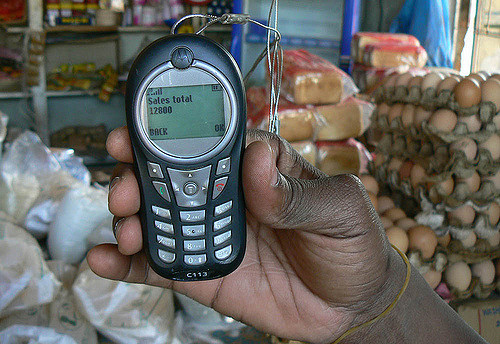Dethroning Cash as King. Why These Major Funders Are So Hyped About Digital Money
/
Within the global development landscape, few funding areas are hotter right now than financial inclusion, and one reason is that funders feel that momentum is on their side.
They're right. Between 2011 and 2014, the number of people with bank accounts grew by 700 million worldwide, according to the World Bank. Also, there has been a 20 percent decrease in the number of people who are considered unbanked.
That said, around 2 billion adults today still do not have a bank account. Perhaps they'll never get one in the traditional sense—and it's this idea, too, that is exciting funders in the financial inclusion space.
Forget things like checkbooks and ATM cards. A device that's now in nearly everyone's hands, the phone, is the new bank.
In sub-Saharan Africa, 12 percent of adults say they utilize mobile money accounts. Considering only around 2 percent of adults worldwide have mobile money accounts, those numbers really say something about the success of the global digital money drive. One organization leading that drive is the Better Than Cash Alliance (BTCA).
BTCA is an alliance with over 50 members including international organizations, governments, corporations, and nonprofits that have joined forces to help the developing world “transition from cash to digital payments in order to reduce poverty and drive inclusive growth.” BTCA is hosted by the UN Capital Development Fund. And it has some serious backers like the Gates Foundation, Citi Foundation, Ford Foundation, MasterCard, Omidyar Network, United States Agency for International Development, and Visa.
Related: How Cash-Heavy Societies Are Less Secure—And What These Foundations are Doing About It
We recently caught up with BTCA's managing director Ruth Goodwin Groen, to learn more about the alliance and what it’s doing to advance financial inclusion.
One thing we were curious to know is why heavy hitters like Gates, Ford, and Omidyar are so hyped about digital money in the first place?
Groen said that not only are digital financial solutions a major key to overall financial inclusion for marginalized and vulnerable populations, they are also “critical” in the global drive toward “increasing women’s economic participation to building the foundation for sustainable growth."
Related: Behind a $16 Million Gates Give for Financial Inclusion Efforts Pakistan
Women’s empowerment, of course, is another white-hot issue in the global development space, with more and more players grasping the importance of gender equity for stronger economic growth and development. BTCA's goals include closing the gender gap, and Groen explained how mobile banking drives women’s empowerment. “If you want to make sure women are participating in the economy and have economic opportunities, one way to do it is by digitizing payments. Women in informal businesses not only increase their economic opportunity by digitizing payments, but it helps them move their business to formality.” The end result is increased social and economic inclusion for women. (See BTCA's report published last year, "Digital Financial Solutions to Advance Women’s Economic Participation.")
But BTCA is a multidimensional outfit and isn’t solely focused on just one or two financial inclusion challenges.
As an implementing partner and member of the G20 Global Partnership for Financial Inclusion, BTCA works closely with governments in an advocacy role to ensure that digitizing payments are a part of their country’s financial inclusion agenda. It's also engaged in humanitarian challenges. People working on the front lines in conflict areas, disaster zones, or health crises need to get paid. Mobile payments are a way to do that quickly and efficiently.
The subject of paying workers who are risking their lives to save others, often in remote locales, doesn't get much attention. But it's a big deal, said Groen. "During the Ebola crisis in Sierra Leone, no one could move around because of the virus.” You would be hard pressed to find anyone willing to go through each hospital and health center to hand out paychecks. Yet if they weren't paid, frontline workers were less likely to stick around—making the spread of Ebola more likely.
BTCA helped to solve the problem, and quickly. It worked with partners to help put "money in mobile wallets so they didn’t have to distribute cash.” This resulted in lives saved because the workers stayed put and didn’t quit or go on strike. (BTCA has just published a case study on digitized payments to Ebola response workers in Sierra Leone.)
Mobile payments are also playing a key role in other hotspots, and BTCA has strong buy-in from top humanitarian groups. Its members include Mercy Corps, the International Rescue Committee, Catholic Relief Services, and CARE.
The Better Than Cash Alliance certainly has a lot of financial inclusion balls in the air. And that’s not likely to change, because according to Ruth Goodwin Groen, BTCA’s overall mission is to “catalyze a global movement." The alliance has a lot of deep-pocketed friends who share that goal.








